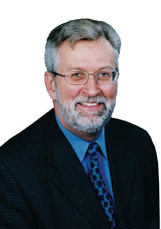AROUND THE QUADS
5 Minutes with... Mark von Hagen
Mark von Hagen, chairman of the history department and the Boris Bakhmeteff Professor of Russian and East European Studies, was from 1995-2001 the director of the Harriman Institute, the nation's oldest university-based research institute for the study of post-Soviet Republics. CCT caught up with him at the beginning of the spring semester.
Q: Where did you grow up?
A: All over the place. My father was in the Air Force, in military intelligence. I
was born in Ohio and then
we moved to France; a
Florida airbase south of Miami; and Bitburg, Germany. My dad would bring home maps of the Eastern Bloc to use as scrap paper.
Q: What did you want to be when you grew up?
A: Either a lawyer or a diplomat.
Q: How did you become interested in Russian history?
A: I started studying Russian in high school. I had a sense that the Soviet Union was so much a part of our identity. We identified everything Soviet as bad, the opposite of who we believed we were. This was during the height of the Cold War: Russian history was a challenge, and exotic in those days. It was like Middle Eastern studies today.
Q: How did you end up at Columbia?
A: After several years of studying Slavic literature at Indiana and teaching Russian, I decided to go to Stanford and do a Ph.D. in history and humanities. When I went back to Leningrad and Moscow to do research for my doctoral dissertation in 1982-83, my parents sent me a clipping by diplomatic pouch, announcing that Harriman had given $10 million to refound the Russian Institute at Columbia as the Harriman Institute. My father joked, "Maybe you'll get a job there!"
In my fourth year, I was teaching the Stanford version of the Core. My late mentor, Alexander Dallin, was out here [in New York]. He said, "Have you applied for the Columbia job?" I said, "I haven't even started writing my dissertation." He said, "If you can write two chapters by the end of January, I think you've got a good shot." They called me out for an interview that spring. And here I am, 22 years later.
Q: You started studying Russian history during the Cold War. How has your discipline changed during the past few decades?
A: Things have gotten more open. When I wrote my dissertation, there were no archives I could use. The Archive of the Red Army, where I needed to do my research, complained that I was a spy. That same archive, when I went back in '88-'89, asked me to help them declassify their papers.
Q: What is your favorite course to teach?
A: "The Rise and Fall of the Soviet Union."
Q: What's your favorite part of the job?
A: Learning about the interesting work that my colleagues are doing - and, occasionally, succeeding in doing something good for someone.
Q: What are you working on?
A: War in a European Borderland: Occupations in Galicia and Russian Ukraine, 1914-1918 - a book I'm excited about - is about occupation regimes on the Eastern Front during World War I. The nationalities involved were the Germans, Poles, Jews, Ukrainians and Russians, just to list the largest ones. It's about how each regime tried to undo the other one, and the unfortunate people in the middle who were being "liberated" all the time.
Q: What are you reading?
A: I can't read for pleasure anymore. Memos?
Q: What is the last movie you saw?
A: Volver.
Q: What is your favorite food?
A: There are two. Hungarian goulash with dumplings, and chuleta frita (fried pork chop and plaintains) at La Nueva Victoria down Broadway.
Q: Coffee or tea?
A: Coffee, most of the time lately.
Q: If you weren't teaching, what might you be doing?
A: I might go into medicine. You can help people through their difficult lives, you can more directly save people with your knowledge. But I've met Yeltsin, Gorbachev, Putin, Walesa. I've had an interesting career.
Interview: Rose Kernochan ’82 Barnard
|









